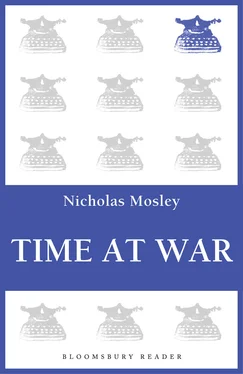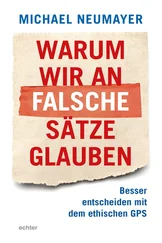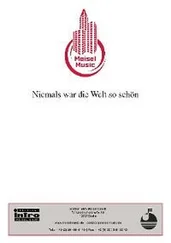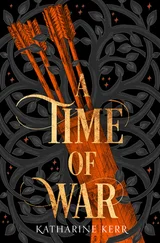The farmhouse was one of those buildings on a slope which, if you go into it on the ground floor at the back, this turns out to be the first floor at the front. There did not seem to be anyone in this first floor where we came to it; the main body of Germans were evidently sheltering in the ground floor at the front. Grenades were being lobbed from round the sides of the house. I called to Tomkinson to go with his section round the right side while I went round on the left. A German had followed me from the farm building with his hands up, smiling. I told him I had no time for him, and to go and find McClarnon. Then I came to a hole in the wall of the house: this led to a room that appeared to be empty. There was also a gap in the floor just beyond the hole through which I could see to the ground floor at the front. This room appeared to be empty too. Then three Germans appeared through a door at the front; they carried automatic weapons; they saw me through the holes in the floor and wall at the same time as I saw them; I fired first and shot two of them in the legs. The third ran out of the door at the front and one of the others hopped after him holding his leg; the other had fallen and lay where he fell. The magazine of my tommygun was now empty; I cursed myself for having spent so much ammunition firing blindly at the rubble of the buildings. I sheltered to one side of my hole while I fixed on a new magazine. By the time I had got back to where I could see down to the ground the second man I had hit in the legs had gone — presumably he had crawled out after the other two. So might I then be glad that I had had no more bullets in my magazine, and need not shoot him again? I called to McClarnon to leave two of his men to guard any prisoners from the buildings, then to come up with what was left of his section and go into and occupy the now empty upstairs and downstairs rooms on the left. This he did. Then I went to see how Tomkinson was doing on the right.
This side of the house was covered by German machine-guns from the hills beyond, and bullets were flying and chipping bits off the walls. Tomkinson had gone forward and taken shelter behind a well near the front of the house; his Bren gunner had been hit and two of his men were dragging him back behind the house. I joined Tomkinson by the well but we could see no door into the house except the one on the left which McClarnon was now guarding. The right front of the house seemed to have collapsed; there was just an opening like a hole to a dugout in the rubble. Bullets were chipping bits of stone around our heads, so we threw a couple of grenades at the opening and I retired in haste. Tomkinson stayed by the well, and when someone fired at him from the opening he stood up and fired what was left in his magazine back at it, before rejoining me in the shelter of the house. Then I sent him with the few men left of his section to join McClarnon who was occupying the rooms on the left.
The third section had by this time come up with my sergeant, and I went again with them to the right front corner because I thought we had to clear this — to take prisoner the Germans who seemed to have barricaded themselves into a basement through the opening in the ground-floor rubble, because surely our position would become untenable if they stayed underneath us during the night. My sergeant threw one grenade at the opening and then was hit by a stray bullet from the hills; he and his section retired to the back of the house. I was by the well, firing blindly and absurdly at the German machine-gunners on the hill who were hundreds of yards out of my tommy-gun’s range. I turned to the house again to throw one last grenade and there was a German who had crawled out of the opening like a hole and was facing me holding an automatic weapon and he fired at me at point-blank range and somehow missed. My magazine was now empty again so I did a flying leap back round the side of the house (I described this later as my ‘Nijinsky leap’) and I determined not to go round to the front again. We would have to hold on to what we had got until morning.
It seemed that we were in occupation of most of the farmhouse except the ground floor or basement on the right, which the Germans indeed seemed to have made impregnable. Above this on the right of the first floor there was a hayloft. From the upstairs room on the left I and others crawled into this loft to see how it could be occupied and defended; then the Germans below started firing up through the floorboards. We jumped about like victims in the red-hot bull of Phalaris; we fired down through the floorboards; and then there were voices again — ‘Don’t shoot, Johnny!’ I tried to remember my schoolboy German: ‘We will not shoot at you if you will not shoot at us!’ Was there not a special conditional tense? And was I not using the word for ‘shit’ instead of ‘shoot’? But what would be the difference? I seemed anyway to have got the message through, because for the rest of the evening and night there was no more shooting up or down through the floorboards.
By this time Mervyn had arrived with the rest of the company and he insisted on going himself to have a look at the right front of the house where there was the opening to where the Germans remained; but he was almost immediately hit in the arm and leg, and was pulled back under cover. I said I would get him back on a stretcher as soon as we had one; but he insisted he was all right, he could get back on his own — and it was vital that he should do this, because he could then explain the seriousness of our situation and could get reinforcements sent up. I would be intensely sorry to see him go, because I needed both him personally and someone who would share the responsibility for defending what we had taken now that night was coming in and there were bound to be counterattacks. But Desmond had come up with Mervyn, and he was a senior lieutenant to me, so he would nominally take over. Then Mervyn went hopping back on one leg by the most direct route to our old positions; and it turned out that he had hopped unharmed straight through a minefield. We became aware of this later when the reinforcements he sent up walked into the minefield, and many were killed or wounded and the rest never got through. This was a disaster for them; but for us it seemed that there were already enough of us crammed into the farmhouse, and Desmond agreed that it would be crazy to consider digging trenches outside. So we settled down to assess our situation.
We had what was left of the three platoons of our company in the two rooms one above the other on the left of the farmhouse — some thirty men, ten of whom had wounds of some sort or other — and nine Bren guns. We arranged these on the two floors with a makeshift ladder between. Then we realised it was quite dark.
During the night three or four counter-attacks did come in from the further hills; but by this time we were experiencing a strange exhilaration. We felt invulnerable, heroic; when we heard Germans approaching we opened fire with all our weapons from every opening in all directions. I remember one man, who had lost his spectacles and could find no room at a window, firing his rifle repeatedly straight up into the air. We yelled and whooped our war cry — Woo-hoo Mahommet! — and blazed away until the attacks seemed to fade into the thin night air. It was all quite like, yes, an apotheosis of a mad apocalyptic children’s game. Only once, I think, did a German get right up to the wall of the house; he shot one of our men point-blank through a window. Grenades usually bounced off the walls and exploded outside. After a time things quietened down. Our wireless was not working, so at least we were out of touch with headquarters so they could not order us to do anything different.
There was the business of tending to the wounded. Amazingly, none of my platoon seemed to have been killed. The man who had been shot through a window was suffering badly, and I and others took turns to sit with him. Eventually stretchers arrived from headquarters and we were able to send him and a few others back; also the prisoners and the wounded German who had been in the farm buildings at the back. The stretcher-bearers told us of the disaster to the reinforcements who had walked into the minefield; but extra ammunition had got through, although no food, and we had eaten nothing since sodden sandwiches the previous midday. Someone found me a bit of black German bread, which I ate ravenously.
Читать дальше












